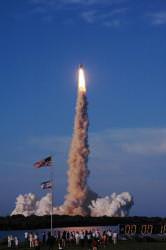

After a three-month delay, the space shuttle Atlantis finally lifted off from Cape Canaveral on Friday, beginning mission STS-117. The shuttle blasted off at 7:38 pm EDT, and reached orbit just a few minutes later.
If everything goes well, Atlantis will spend the next 11 days in orbit, delivering a new set of solar arrays to the International Space Station, increasing its ability to generate power. The shuttle is also carrying a longer-staying visitor to the station; mission specialist Clayton C. Anderson will remain on board, and Atlantis will carry Suni Williams back down after 6 months in space.
The long delay started back in March, when a freak hailstorm pounded the shuttle’s external fuel tank, chewing up the delicate foam insulation. Workers brought the shuttle back to the Vehicle Assembly Building and repaired it, before returning it to launch Pad 39-A.
Atlantis is currently matching orbits with the International Space Station, and the two spacecraft will link up on Sunday.
Original Source: NASA News Release
If you were Captain of the first USS Enterprise, where would you go!? Humanity is…
Now is the best time to observe Mars in 2025. Mars from 2014. Credit: Paul…
Scheduled for launch in 2027, the Nancy Grace Roman Telescope is slowly being readied for…
Few places in the solar system are better suited to a balloon than Titan. The…
We reported before about a NIAC-funded project known as the Lofted Environment and Atmospheric Venues…
The InSight Lander arrived on Mars in 2018 to study the planet's interior. Its mission…